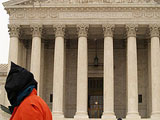Costs of War: Cracks in the Edifice
By Shaun Waterman for ISN
When Attorney General Eric Holder announced the decision Friday, he noted that he was speaking “just over eight years” after the suicide hijacking attacks. But he neglected to mention he was speaking on another, more telling, anniversary. His announcement came external pageeight years to the daycall_made after the promulgation by the Bush administration of an external pageexecutive ordercall_made giving the president the authority to designate individuals as ‘enemy combatants,’ subject to trial by military commissions and whose treatment was not governed by either by the US Constitution or by the Geneva Conventions.
A secret presidential memorandum laying out new authorities for the nation’s military and intelligence agencies as they prosecuted Bush’s war on terror external pagehad already been signed on 17 Septembercall_made. And by that time, Bush officials had already begun anonymously briefing reporters about the secret war they planned against al-Qaida.
The military commission’s order was one of the first public, formal signs that the administration planned to pursue a strategy in that conflict largely untrammeled by US obligations under international law or by the restrictions the constitution placed on state power.
The 13 November 2001 order was one of the cornerstones of that strategy. It was of a piece with the extra-legal renditions to torture of suspected terrorists; the attempt to use the US Naval base at Guantanamo Bay, Cuba, as a legal black hole beyond the reach of US courts; and the development of a network of secret CIA jails where detainees could be subject to water-boarding and other ‘enhanced interrogations techniques.’
That strategy damaged the US' standing in the world and helped strip the war on terror of the moral legitimacy it enjoyed when it was first declared in the aftermath of 9/11. And it was crumbling even before President Barack Obama took office - the Supreme Court declared the military commissions Bush established unconstitutional and claimed jurisdiction over Guantanamo; the external pageRed Cross saidcall_made those ‘enhanced interrogation techniques’ amounted to torture; CIA officers were prosecuted in an Italian court for criminal offences arising from rendition; and the network of secret prisons was closed.
The decision to bring Mohammed and the other plotters in US custody to trial in New York is the latest widening crack in that edifice. It was presaged back in April when external pageObama told employees at the CIAcall_made, “I believe that our nation is stronger and more secure when we deploy the full measure of both our power and the power of our values - including the rule of law.”
Modified continuity
The decision brought howls of protest from Bush supporters and other Republican critics.
Debra Burlingame, whose brother was the pilot of the plane that was crashed into the Pentagon, and who appeared at the Republican convention in 2004 to back Bush’s re-election, predicted that the trial would become a farce marked by Mohammed "mocking his victims, exulting in the suffering of their families, ridiculing the judge, his lawyers and the American justice system, and worst of all, rallying his jihad brothers to kill more Americans.”
And former GOP presidential candidate and New York Mayor Rudolph Giuliani called it “part of a bigger picture […] part of Barack Obama deciding that we're not at war with terrorism any longer.”
But in reality, Obama is continuing to use - albeit in modified form - much of the machinery his predecessor established. Renditions will continue, the administration says, albeit with enhanced safeguards; officials acknowledge they do not know when they will be able to fulfill their promise to close the detention center at Guantanamo; and Holder also announced Friday that five other detainees would be tried in the new military commissions Obama has established.
“Just as a sustained campaign against terrorism requires a combination of intelligence, law enforcement and military operations, so must our legal efforts to bring terrorists to justice involve both federal courts and reformed military commissions,” said Holder.
Among the five who will face commissions is Omar Khadr, a Canadian citizen who was 15 years old when he was captured in Afghanistan. His lawyers argue he was a child soldier conscripted by his late father, a long-time al-Qaida militant.
Obama has already taken heat from some of his more ardent supporters for the deliberate pace at which he has moved in dismantling the legal edifice of Bush’s war on terror. And human rights advocates clearly have mixed feelings about Friday’s announcement.
While welcoming it as “an important step toward reinstating the rule of law,” Amnesty International’s US policy director for counterterrorism, Tom Parker, called the decision “narrow.”
“The military commissions have already shown they cannot provide due process or fair trials; they should be abandoned,” he concluded, noting that, since 9/11, federal courts in the US have convicted 195 people of terrorism offenses while military commissions have convicted only one.

